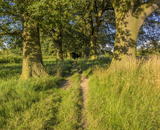Intervention on rights-of-way
Home owners are to have an option of diverting any re-established rights of way around their properties


An intervention by Defra in the forthcoming Deregulation Bill offers hope to those whose lives are blighted by an ancient right of way, which may no longer be practicable, being reopened through their property.
The Bill, which aims to cut red tape, would have made it easier for access groups to bypass Defra in getting old public rights of way re-established before the cutoff date of 2026. However, a small pressure group, which has been campaigning against intrusive paths for some 20 years, may have scored a victory. Home owners can now apply to Defra to get the path diverted around their property, for which they will have to pay.
The Alternative Stakeholders' Working Group, which says family homes should be exempted from this element of the Bill, cites case studies such as a garden in Warwickshire through which a marathon is run; a Somerset farmer nearly bankrupted fighting against impractical bridlepaths, including one under a low railway bridge; and a Suffolk farmer being forced to take down the gates that kept his livestock in.
There are numerous examples of passers-by parking cars in driveways, picnicking on garden walls, nosing around outbuildings, staring through windows and letting dogs loose, as well as cases of abuse and theft.
‘It's taken a long time to get this far,' says group member Colin Ray, ‘but I'm optimistic. There seems to be a rotten element in the rights-of-way culture that ignores the ethics of family life, but people are waking up to the issue and all MP s we talk to are supportive. We are having regular contact with Defra and will be taking it real examples to test anything it proposes.'
The issue has proved divisive in the media, but Elizabeth Kirk of the Byways and Bridleways Trust, herself a landowner, says in The Times: ‘Once a route is established, there is no reason why some element of diversion should not be agreed.'
* Follow Country Life on Twitter
Exquisite houses, the beauty of Nature, and how to get the most from your life, straight to your inbox.
Country Life is unlike any other magazine: the only glossy weekly on the newsstand and the only magazine that has been guest-edited by His Majesty The King not once, but twice. It is a celebration of modern rural life and all its diverse joys and pleasures — that was first published in Queen Victoria's Diamond Jubilee year. Our eclectic mixture of witty and informative content — from the most up-to-date property news and commentary and a coveted glimpse inside some of the UK's best houses and gardens, to gardening, the arts and interior design, written by experts in their field — still cannot be found in print or online, anywhere else.
